Everton Football Club - Blue is the colour
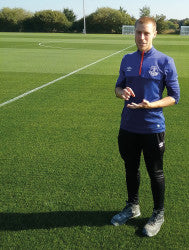
I have never followed football, and the culture associated with it has always made me steer clear of ever supporting, or pretending to support, anyone. I will tell you what though, after a trip to Goodison Park recently, home of Everton Football Club, I know where I would like to watch my first game.
I went with ALS Technical Manager Ian Somerville to meet Ryan Powell, newly crowned Young Groundsman of the Year 2015, who splits his time between the stadium and the training ground, Finch Farm. Setting off not quite knowing what I was in for, I managed to spend most of a very enjoyable day chatting to groundsman Ryan, Head Groundsman Bob Lennon, and the rest of the team at the training ground, and came away more than a little "Blue".
Ryan had his award to hand when we turned up, evidently extremely proud of his achievement. Not that he would take the sole credit for it; that is definitely not his style. "When you accept the award, it reflects well on everyone at the club. It has been a group effort. Without Everton Football Club, it wouldn't be possible. I owe a lot to the lads and to the club. Without them, I wouldn't be where I am today."
The team is a big one, with thirteen groundsmen split between Goodison and Finch Farm, although Ryan says, "We could just keep going. We could add another five onto the thirteen of us, because there is such a big area at Finch Farm and there's such high standards that the club require." Like "one big happy family" as Ryan puts it, they all know what needs to be done, and seem to be on the same page. Everybody has their different methods of doing things, which Ryan has a lot of appreciation for: "It's great for me because I can learn about everything. I am learning ten different ways to do something. You're going to find one that is best suited to you and what works for you. I get a lot of support from the lads at Finch Farm."
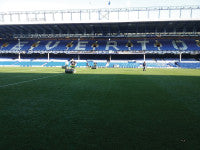
An avid sports enthusiast, Ryan played anything and everything, but it was while playing cricket at Liverpool Cricket Club that he discovered what it was that he really wanted to do. He saw Terry Glover, the groundsman at the cricket club, and a man who Ryan still keeps in contact with, pushing covers, and went over to ask him why he was doing it. "He said to get at the end of the cover and give him a hand, and that's literally where it came from. I started doing bits for him; the odd hour, painting wickets, putting the stumps out and, gradually, helping with the rugby on a Saturday."
Ryan then started working in a voluntary capacity at the cricket ground, and then went for a job at Everton, when it came up, and got on the apprenticeship programme.
"It's a fantastic place. I love it more and more each year. It inspires me more and more as I learn more." He really does get the best of both worlds with his work on both sites, which again, he is fully aware of and doesn't take for granted.

Presentation and the cosmetics of the match pitch is a huge focus for Bob and the team. Ryan says; "It's about sponsorship now. They want to be associated with a nice clean image." Something that the team and their Desso pitch, installed a couple of years ago, are certainly doing a good job of promoting.
Talking to a very animated Ryan about the installation of the Desso pitch made it evident how exciting he found the process: "It was unbelievable, because I've never seen the pitch taken down to the gravel carpet and the undersoil heating. The pipes get exposed and it's absolutely fantastic. It was a million miles away from what you see now; it was a sand dune, with people pulling pipes, gravel mixing with different soil profile, it was all over the show and you never ever thought that it would be where it is now."

The undersoil heating bevels up at the end of the pitch and that all had to come up by hand, with Ryan and the team digging around and putting the pipes lower so it was even throughout the pitch. "You panic, but it does come together in the end. It is an absolute godsend. Desso is fantastic."
The club are also looking to get two Desso training pitches installed at Finch Farm, so Ryan and Bob have travelled to various training grounds to see how they manage these areas.
As well as the two new Desso additions, the club have just bought fifteen acres of land down a the bottom of the site, "It's quite a rural area, mostly green belt, so we've done well buying land right down to Lower Lane. We will put another four or five pitches on, which are going to be solely community based. We've got such community backing from the club, I think it is the biggest in the Premier League. They are ahead of their game in that regard." Ryan tells me.
With fourteen pitches already, four more will certainly add to the workload and, as Ryan tells me, "it doesn't do it justice to just say fourteen pitches, because it's fifty-five acres of playing area; and the environmental area is massive!" Not only do the pitches have to be kept to a high standard, but the environmental area is what takes up a lot of the team's time, with environmental policies to follow in abundance.
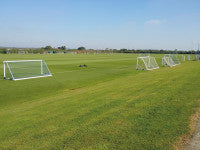
"Prior to coming into Everton, I just thought it would be a matter of cutting the banks and that would be it," Ryan says. "But you don't understand that there's wildlife in there and you've got policies you've got to actually follow, which is a massive, massive thing. We've got different habitats and great crested newts and all that."
The ground is not far from the Mersey estuary too, so they have a lot of estuary birds paying a visit.
Different birds entirely cause a stir at the match pitch, and Bob has earned the nickname "Catch the Pigeon" as a result of witnessing him chasing them off the pitch. The pigeons, feral cats and magpies are a pain at Goodison, but it is something that an inner city club has to deal with, it seems.
"You can tell when Goodison has grass seed down because there won't be any pigeons down the road at Anfield, and vice versa," Ryan tells me, as we stand and watch a pigeon that has escaped Bob's notice strut around on the pitch.
So, how will they be going about this weekend, with a Premier League match against Aston Villa on Saturday and an under 21s game against Porto on Sunday? "We've known for a while in the calendar that we've got these back to back games. So our preparation is done weeks in advance; getting nitrogen levels right and making sure the plant is at its optimum, otherwise it's going to get stressed out. If you start seeing signs of stress before a game, it's too late by then."
All they would do after the Villa game on Saturday would be to rotary mow to pick everything up, and then make sure it was divot free for the Sunday game. "The vigour and the colour should have, again, been done weeks in advance."
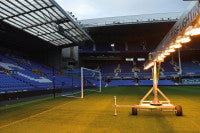
Bob and the team use the rigs wisely, and make sure that the high wear areas where the goalkeepers warm up have as many hours of light as they can, and have the best possible chance. "We have the little baby rigs down there as well. We will have Tim Howard warming up this side, so we will try and get that nice and strong and standing up as best as we can, because we know he is going to go on it and it is going to be stressed out." They are careful to only hit the allotted daytime hours however; "anything more and you can stress out the plant because it's detrimental to what you actually need."
Currently studying for his FdSc with Myerscough College, he is eager to learn and applies the science that he so enjoys studying to the job he is doing daily. "I know the signs of something, but I am learning the science behind it now. Like Bob, he knows the science behind it and he links the two. I think it's a great combination," Ryan says, "Give me a little hint of what I should do and I want to go and find out about it. I have a genuine interest."

With Ryan's award, and all the changes happening at the training ground, it seems like an exciting chapter for the Everton grounds team. The atmosphere is palpable, even when the stadium is empty, and the comradery within the team is really nice to see.
Even without his achievement, I can see why Ryan is so well liked, and why he is going to continue to get a lot more networking opportunities in the future although, for now, invites to visit Real Madrid, Twickenham and Ohio should do. He is excited about his prospects, and is eager to help young, aspiring grounds people too. "I don't like saying it, but I am the future of our industry," he says and, as Bob tells me; "It's Ryan's year this year."
Who's who ... and what's what?
The groundstaff
Three people work permanently at Goodison: Bob Lennon, John Howell and Tony Balshaw.
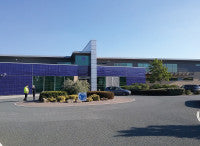
Goodison pitch
One of the few clubs in the Premier League with a camber. "It's totally cosmetic now. It does have an effect, but it's more about the heritage," Ryan says.
Training ground pitches
The building is split in two, so one side is the academy and one side is for the professionals.
The club take a sports psychology approach to the layout of the grounds: There are two plateaus for the pitches. The top is for the first team and the reserve team, and the other pitches are for the youngsters up until eighteen.
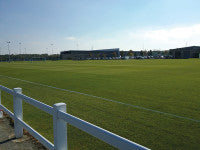
The Free School
Everton Free School is another first for Everton Football Club. They offer alternative educational opportunities and experiences to young people aged 14-16 and Level 2 and 3 sixth form.
Family enclosure and cheap tickets for youngsters:
"Giving the kids a good experience so that hopefully they will bring their kids when they grow up."
